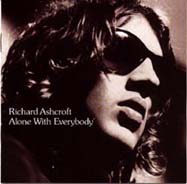By Tony Bonyata
Maybe the success of the swelling orchestration of The Verve's 1997 smash hit "Bittersweet Symphony" went to singer / songwriter's Richard Ashcroft's head. On his debut solo album, Alone With Everybody, Ashcroft uses a similar formula to that of his former band - a richly textured string section over a clean rock sound with songs brimming with indelible melodies and irresistible pop. Formed in 1990 in Northern England, The Verve became a huge success on the other side of the pond with their mixture of Brit-pop meets psychedelia. It wasn't until their third album Urban Hymns was released in 1997 that they made a splash in the States. The pressures of fame and touring, however, became too much for the band to cope with and they eventually broke up in 1999.
Formed in 1990 in Northern England, The Verve became a huge success on the other side of the pond with their mixture of Brit-pop meets psychedelia. It wasn't until their third album Urban Hymns was released in 1997 that they made a splash in the States. The pressures of fame and touring, however, became too much for the band to cope with and they eventually broke up in 1999.While the other bandmembers have been keeping moderately busy with minor side projects, Ashcroft has utilized the talents of The Verve's drummer Peter Salisbury on a collection of well-penned numbers that are as strong as anything he's written in the past. And even though he may have lifted an element of his former band's recipe for gold, it doesn't mean that he hasn't added any new ingredients to the mixture.
While some of the numbers from Alone With Everybody are more than slightly reminiscent of The Verve, Ashcroft manages to add enough finishing touches to make a discerning distinction between the two. Numbers such as the opener "A Song For Lovers," with its harmonic tapestry colored with the aid of trumpet and harp, and the melancholy "Brave New World," which features the lazy twang of a pedal steel guitar, both offer up a fresh twist on an old idea.
Although Ashcroft was forced to pay all royalties from The Verve's hit "Bittersweet Symphony" to Rolling Stones' one-time manager Allen Klein, for lifting the melody from an Andrew Loog Oldham instrumental version of The Rolling Stones' number "The Last Time," he still continues to subtly shine a light on the Glimmer Twins. Not only does the song "Money To Burn" mix the earthy sound of The Stones, circa '72, with the backwoods groove of The Black Crowes, but he's also hired The Stones' touring pianist Chuck Leavell to add his own honky tonk keys on a few numbers.
On the wonderfully tough number "New York" and "Crazy World" Ashcroft severs all ties with his past and creates a unique sound which actually has more in common with the more experimental, latter-day U2 than that of his own Brit-pop past.
While many fans mourn the loss of his former band, Ashcroft has delivered a bright debut with as much verve as anything he's done before.